An Analysis of Music in Sufism: Qawwali and its Impact in Pakistan
VerifiedAdded on 2023/01/19
|15
|5213
|84
Essay
AI Summary
This paper investigates the role of music, particularly Qawwali, within the framework of Sufism in Pakistan. It begins by defining Sufism as Islamic mysticism and highlighting its emphasis on achieving union with Allah through various practices. The paper then explores the significance of Qawwali, a devotional musical genre originating in South Asia, as a key element of Sufi practice, particularly in Pakistan. The paper traces the historical development of Qawwali, crediting Amir Khusrow with its innovation, and discusses its evolution over time. It highlights how Qawwali serves as a means of expressing devotion, spreading Islamic teachings, and fostering a sense of unity and cultural identity among Muslims. The paper also acknowledges the influence of technology and changing times on Qawwali. The paper concludes by emphasizing the integral role of Qawwali in Pakistani culture, tracing its roots back over 600 years and its enduring influence on the nation.
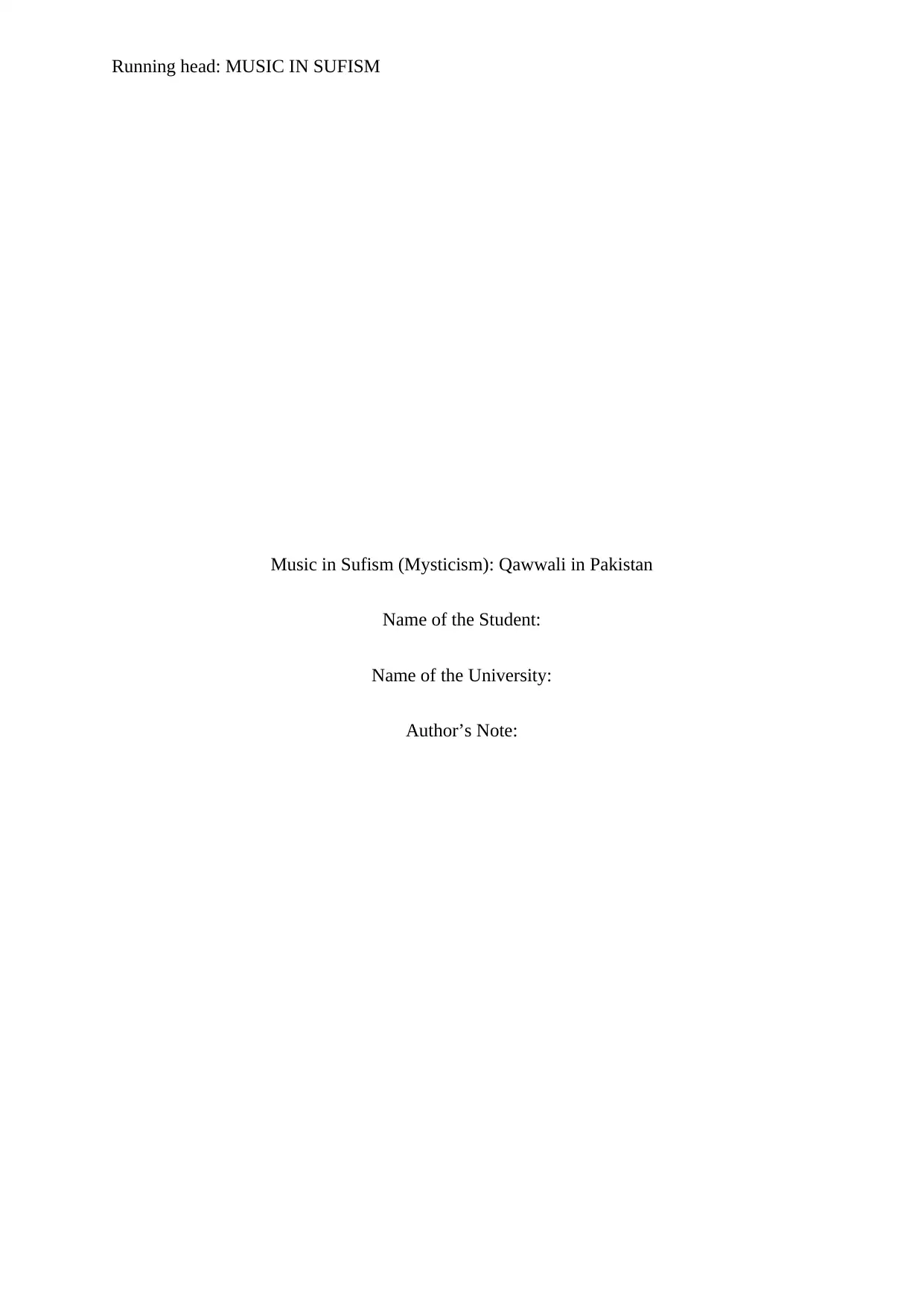
Running head: MUSIC IN SUFISM
Music in Sufism (Mysticism): Qawwali in Pakistan
Name of the Student:
Name of the University:
Author’s Note:
Music in Sufism (Mysticism): Qawwali in Pakistan
Name of the Student:
Name of the University:
Author’s Note:
Paraphrase This Document
Need a fresh take? Get an instant paraphrase of this document with our AI Paraphraser
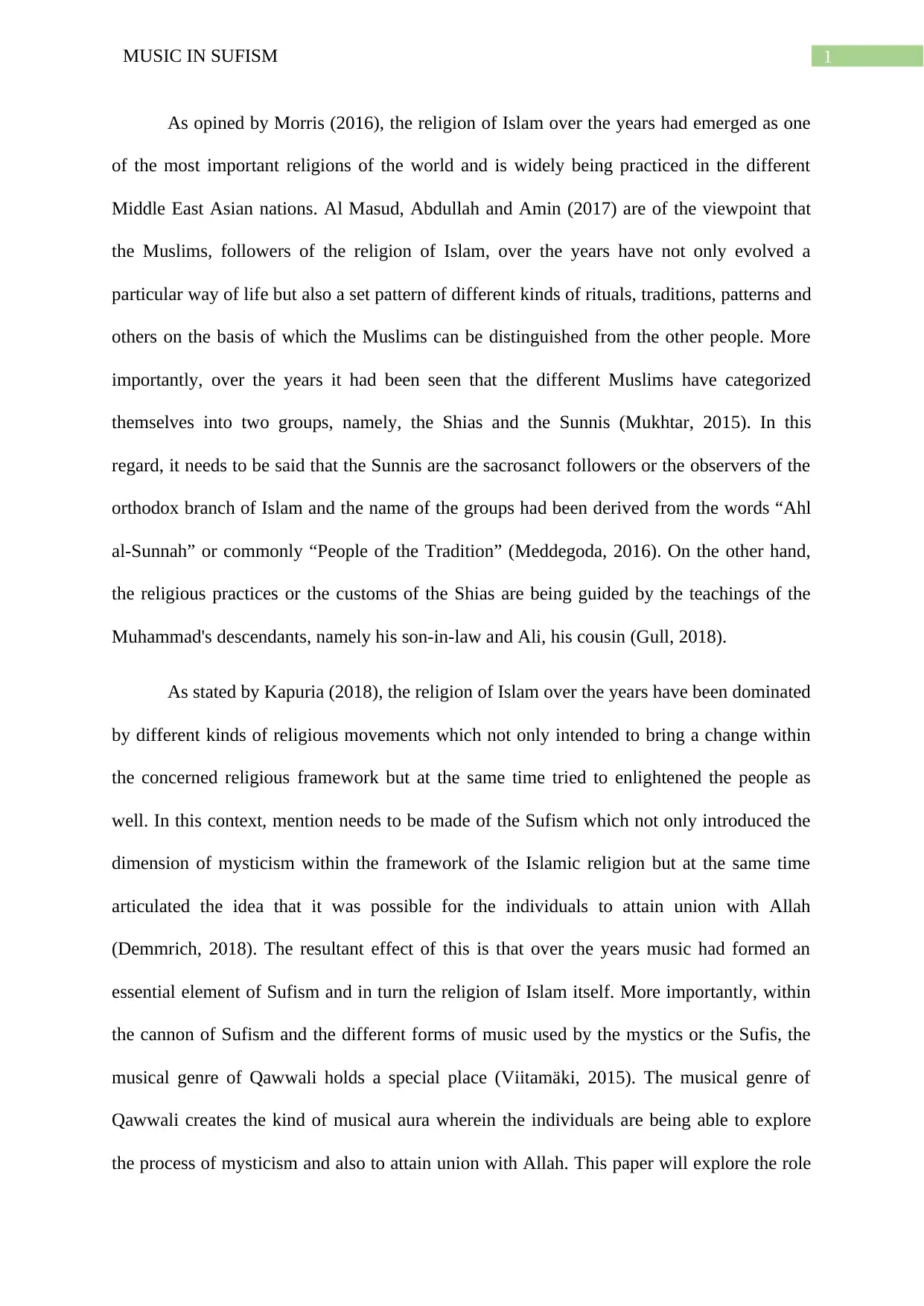
1MUSIC IN SUFISM
As opined by Morris (2016), the religion of Islam over the years had emerged as one
of the most important religions of the world and is widely being practiced in the different
Middle East Asian nations. Al Masud, Abdullah and Amin (2017) are of the viewpoint that
the Muslims, followers of the religion of Islam, over the years have not only evolved a
particular way of life but also a set pattern of different kinds of rituals, traditions, patterns and
others on the basis of which the Muslims can be distinguished from the other people. More
importantly, over the years it had been seen that the different Muslims have categorized
themselves into two groups, namely, the Shias and the Sunnis (Mukhtar, 2015). In this
regard, it needs to be said that the Sunnis are the sacrosanct followers or the observers of the
orthodox branch of Islam and the name of the groups had been derived from the words “Ahl
al-Sunnah” or commonly “People of the Tradition” (Meddegoda, 2016). On the other hand,
the religious practices or the customs of the Shias are being guided by the teachings of the
Muhammad's descendants, namely his son-in-law and Ali, his cousin (Gull, 2018).
As stated by Kapuria (2018), the religion of Islam over the years have been dominated
by different kinds of religious movements which not only intended to bring a change within
the concerned religious framework but at the same time tried to enlightened the people as
well. In this context, mention needs to be made of the Sufism which not only introduced the
dimension of mysticism within the framework of the Islamic religion but at the same time
articulated the idea that it was possible for the individuals to attain union with Allah
(Demmrich, 2018). The resultant effect of this is that over the years music had formed an
essential element of Sufism and in turn the religion of Islam itself. More importantly, within
the cannon of Sufism and the different forms of music used by the mystics or the Sufis, the
musical genre of Qawwali holds a special place (Viitamäki, 2015). The musical genre of
Qawwali creates the kind of musical aura wherein the individuals are being able to explore
the process of mysticism and also to attain union with Allah. This paper will explore the role
As opined by Morris (2016), the religion of Islam over the years had emerged as one
of the most important religions of the world and is widely being practiced in the different
Middle East Asian nations. Al Masud, Abdullah and Amin (2017) are of the viewpoint that
the Muslims, followers of the religion of Islam, over the years have not only evolved a
particular way of life but also a set pattern of different kinds of rituals, traditions, patterns and
others on the basis of which the Muslims can be distinguished from the other people. More
importantly, over the years it had been seen that the different Muslims have categorized
themselves into two groups, namely, the Shias and the Sunnis (Mukhtar, 2015). In this
regard, it needs to be said that the Sunnis are the sacrosanct followers or the observers of the
orthodox branch of Islam and the name of the groups had been derived from the words “Ahl
al-Sunnah” or commonly “People of the Tradition” (Meddegoda, 2016). On the other hand,
the religious practices or the customs of the Shias are being guided by the teachings of the
Muhammad's descendants, namely his son-in-law and Ali, his cousin (Gull, 2018).
As stated by Kapuria (2018), the religion of Islam over the years have been dominated
by different kinds of religious movements which not only intended to bring a change within
the concerned religious framework but at the same time tried to enlightened the people as
well. In this context, mention needs to be made of the Sufism which not only introduced the
dimension of mysticism within the framework of the Islamic religion but at the same time
articulated the idea that it was possible for the individuals to attain union with Allah
(Demmrich, 2018). The resultant effect of this is that over the years music had formed an
essential element of Sufism and in turn the religion of Islam itself. More importantly, within
the cannon of Sufism and the different forms of music used by the mystics or the Sufis, the
musical genre of Qawwali holds a special place (Viitamäki, 2015). The musical genre of
Qawwali creates the kind of musical aura wherein the individuals are being able to explore
the process of mysticism and also to attain union with Allah. This paper will explore the role
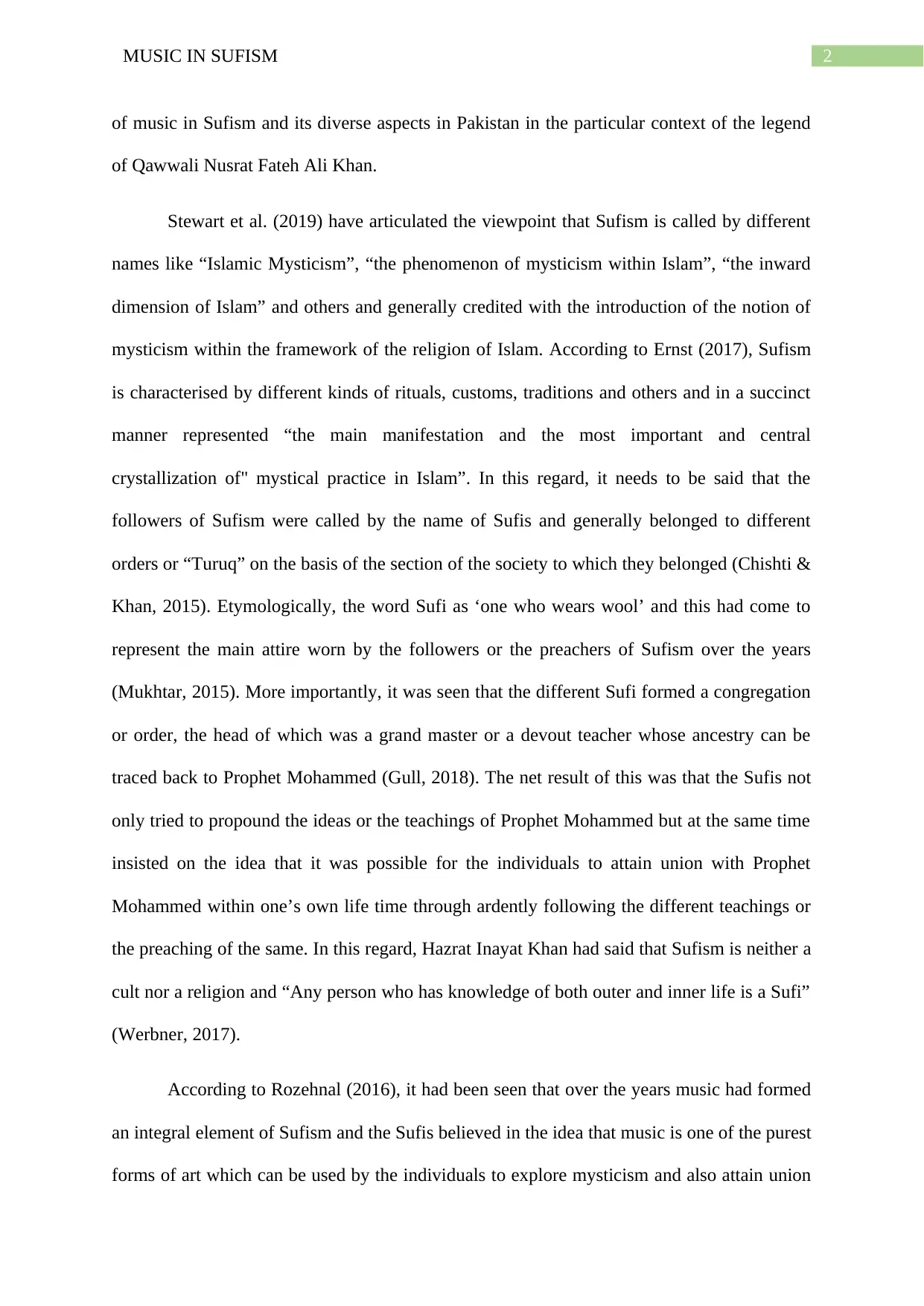
2MUSIC IN SUFISM
of music in Sufism and its diverse aspects in Pakistan in the particular context of the legend
of Qawwali Nusrat Fateh Ali Khan.
Stewart et al. (2019) have articulated the viewpoint that Sufism is called by different
names like “Islamic Mysticism”, “the phenomenon of mysticism within Islam”, “the inward
dimension of Islam” and others and generally credited with the introduction of the notion of
mysticism within the framework of the religion of Islam. According to Ernst (2017), Sufism
is characterised by different kinds of rituals, customs, traditions and others and in a succinct
manner represented “the main manifestation and the most important and central
crystallization of" mystical practice in Islam”. In this regard, it needs to be said that the
followers of Sufism were called by the name of Sufis and generally belonged to different
orders or “Turuq” on the basis of the section of the society to which they belonged (Chishti &
Khan, 2015). Etymologically, the word Sufi as ‘one who wears wool’ and this had come to
represent the main attire worn by the followers or the preachers of Sufism over the years
(Mukhtar, 2015). More importantly, it was seen that the different Sufi formed a congregation
or order, the head of which was a grand master or a devout teacher whose ancestry can be
traced back to Prophet Mohammed (Gull, 2018). The net result of this was that the Sufis not
only tried to propound the ideas or the teachings of Prophet Mohammed but at the same time
insisted on the idea that it was possible for the individuals to attain union with Prophet
Mohammed within one’s own life time through ardently following the different teachings or
the preaching of the same. In this regard, Hazrat Inayat Khan had said that Sufism is neither a
cult nor a religion and “Any person who has knowledge of both outer and inner life is a Sufi”
(Werbner, 2017).
According to Rozehnal (2016), it had been seen that over the years music had formed
an integral element of Sufism and the Sufis believed in the idea that music is one of the purest
forms of art which can be used by the individuals to explore mysticism and also attain union
of music in Sufism and its diverse aspects in Pakistan in the particular context of the legend
of Qawwali Nusrat Fateh Ali Khan.
Stewart et al. (2019) have articulated the viewpoint that Sufism is called by different
names like “Islamic Mysticism”, “the phenomenon of mysticism within Islam”, “the inward
dimension of Islam” and others and generally credited with the introduction of the notion of
mysticism within the framework of the religion of Islam. According to Ernst (2017), Sufism
is characterised by different kinds of rituals, customs, traditions and others and in a succinct
manner represented “the main manifestation and the most important and central
crystallization of" mystical practice in Islam”. In this regard, it needs to be said that the
followers of Sufism were called by the name of Sufis and generally belonged to different
orders or “Turuq” on the basis of the section of the society to which they belonged (Chishti &
Khan, 2015). Etymologically, the word Sufi as ‘one who wears wool’ and this had come to
represent the main attire worn by the followers or the preachers of Sufism over the years
(Mukhtar, 2015). More importantly, it was seen that the different Sufi formed a congregation
or order, the head of which was a grand master or a devout teacher whose ancestry can be
traced back to Prophet Mohammed (Gull, 2018). The net result of this was that the Sufis not
only tried to propound the ideas or the teachings of Prophet Mohammed but at the same time
insisted on the idea that it was possible for the individuals to attain union with Prophet
Mohammed within one’s own life time through ardently following the different teachings or
the preaching of the same. In this regard, Hazrat Inayat Khan had said that Sufism is neither a
cult nor a religion and “Any person who has knowledge of both outer and inner life is a Sufi”
(Werbner, 2017).
According to Rozehnal (2016), it had been seen that over the years music had formed
an integral element of Sufism and the Sufis believed in the idea that music is one of the purest
forms of art which can be used by the individuals to explore mysticism and also attain union
⊘ This is a preview!⊘
Do you want full access?
Subscribe today to unlock all pages.

Trusted by 1+ million students worldwide
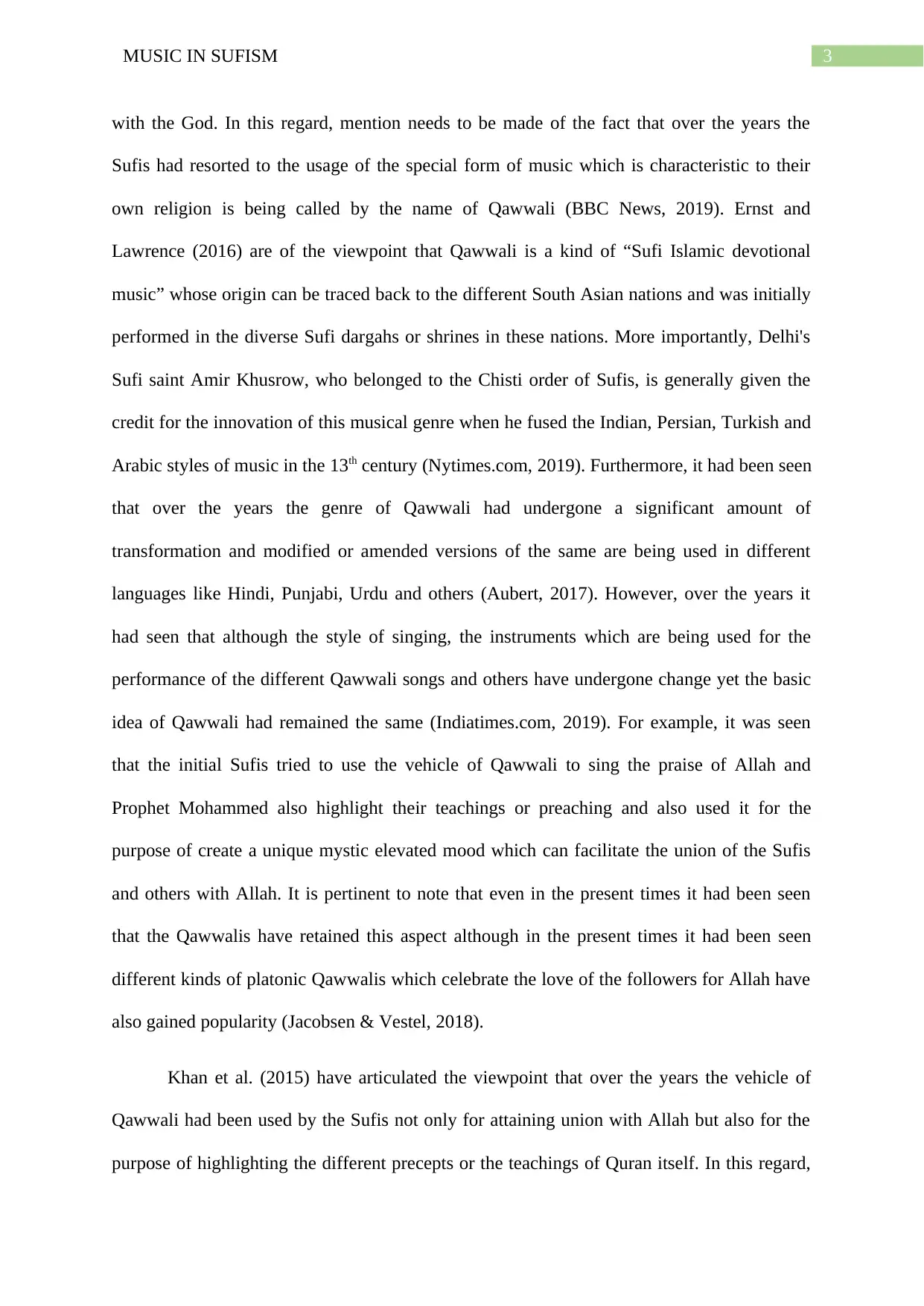
3MUSIC IN SUFISM
with the God. In this regard, mention needs to be made of the fact that over the years the
Sufis had resorted to the usage of the special form of music which is characteristic to their
own religion is being called by the name of Qawwali (BBC News, 2019). Ernst and
Lawrence (2016) are of the viewpoint that Qawwali is a kind of “Sufi Islamic devotional
music” whose origin can be traced back to the different South Asian nations and was initially
performed in the diverse Sufi dargahs or shrines in these nations. More importantly, Delhi's
Sufi saint Amir Khusrow, who belonged to the Chisti order of Sufis, is generally given the
credit for the innovation of this musical genre when he fused the Indian, Persian, Turkish and
Arabic styles of music in the 13th century (Nytimes.com, 2019). Furthermore, it had been seen
that over the years the genre of Qawwali had undergone a significant amount of
transformation and modified or amended versions of the same are being used in different
languages like Hindi, Punjabi, Urdu and others (Aubert, 2017). However, over the years it
had seen that although the style of singing, the instruments which are being used for the
performance of the different Qawwali songs and others have undergone change yet the basic
idea of Qawwali had remained the same (Indiatimes.com, 2019). For example, it was seen
that the initial Sufis tried to use the vehicle of Qawwali to sing the praise of Allah and
Prophet Mohammed also highlight their teachings or preaching and also used it for the
purpose of create a unique mystic elevated mood which can facilitate the union of the Sufis
and others with Allah. It is pertinent to note that even in the present times it had been seen
that the Qawwalis have retained this aspect although in the present times it had been seen
different kinds of platonic Qawwalis which celebrate the love of the followers for Allah have
also gained popularity (Jacobsen & Vestel, 2018).
Khan et al. (2015) have articulated the viewpoint that over the years the vehicle of
Qawwali had been used by the Sufis not only for attaining union with Allah but also for the
purpose of highlighting the different precepts or the teachings of Quran itself. In this regard,
with the God. In this regard, mention needs to be made of the fact that over the years the
Sufis had resorted to the usage of the special form of music which is characteristic to their
own religion is being called by the name of Qawwali (BBC News, 2019). Ernst and
Lawrence (2016) are of the viewpoint that Qawwali is a kind of “Sufi Islamic devotional
music” whose origin can be traced back to the different South Asian nations and was initially
performed in the diverse Sufi dargahs or shrines in these nations. More importantly, Delhi's
Sufi saint Amir Khusrow, who belonged to the Chisti order of Sufis, is generally given the
credit for the innovation of this musical genre when he fused the Indian, Persian, Turkish and
Arabic styles of music in the 13th century (Nytimes.com, 2019). Furthermore, it had been seen
that over the years the genre of Qawwali had undergone a significant amount of
transformation and modified or amended versions of the same are being used in different
languages like Hindi, Punjabi, Urdu and others (Aubert, 2017). However, over the years it
had seen that although the style of singing, the instruments which are being used for the
performance of the different Qawwali songs and others have undergone change yet the basic
idea of Qawwali had remained the same (Indiatimes.com, 2019). For example, it was seen
that the initial Sufis tried to use the vehicle of Qawwali to sing the praise of Allah and
Prophet Mohammed also highlight their teachings or preaching and also used it for the
purpose of create a unique mystic elevated mood which can facilitate the union of the Sufis
and others with Allah. It is pertinent to note that even in the present times it had been seen
that the Qawwalis have retained this aspect although in the present times it had been seen
different kinds of platonic Qawwalis which celebrate the love of the followers for Allah have
also gained popularity (Jacobsen & Vestel, 2018).
Khan et al. (2015) have articulated the viewpoint that over the years the vehicle of
Qawwali had been used by the Sufis not only for attaining union with Allah but also for the
purpose of highlighting the different precepts or the teachings of Quran itself. In this regard,
Paraphrase This Document
Need a fresh take? Get an instant paraphrase of this document with our AI Paraphraser
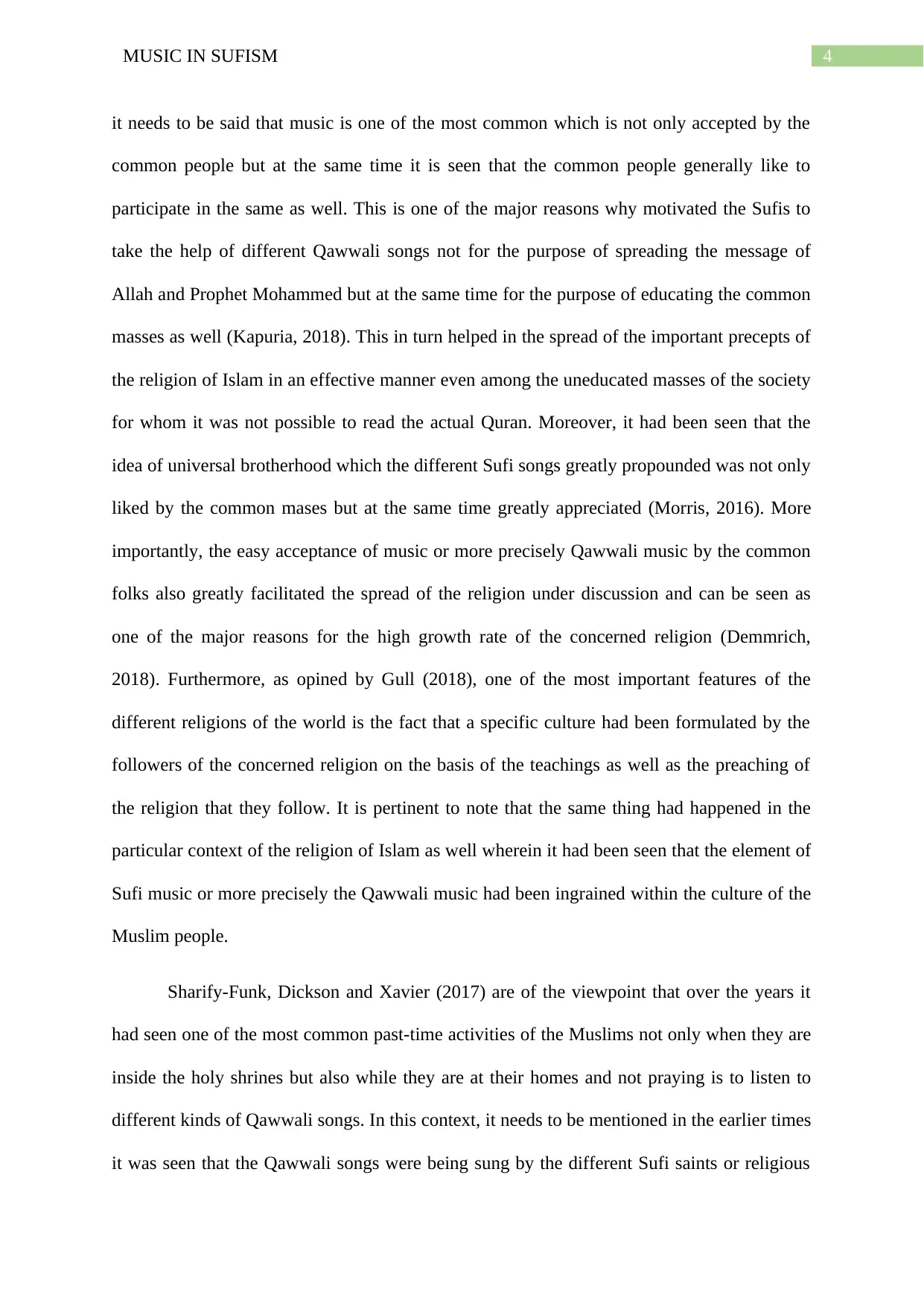
4MUSIC IN SUFISM
it needs to be said that music is one of the most common which is not only accepted by the
common people but at the same time it is seen that the common people generally like to
participate in the same as well. This is one of the major reasons why motivated the Sufis to
take the help of different Qawwali songs not for the purpose of spreading the message of
Allah and Prophet Mohammed but at the same time for the purpose of educating the common
masses as well (Kapuria, 2018). This in turn helped in the spread of the important precepts of
the religion of Islam in an effective manner even among the uneducated masses of the society
for whom it was not possible to read the actual Quran. Moreover, it had been seen that the
idea of universal brotherhood which the different Sufi songs greatly propounded was not only
liked by the common mases but at the same time greatly appreciated (Morris, 2016). More
importantly, the easy acceptance of music or more precisely Qawwali music by the common
folks also greatly facilitated the spread of the religion under discussion and can be seen as
one of the major reasons for the high growth rate of the concerned religion (Demmrich,
2018). Furthermore, as opined by Gull (2018), one of the most important features of the
different religions of the world is the fact that a specific culture had been formulated by the
followers of the concerned religion on the basis of the teachings as well as the preaching of
the religion that they follow. It is pertinent to note that the same thing had happened in the
particular context of the religion of Islam as well wherein it had been seen that the element of
Sufi music or more precisely the Qawwali music had been ingrained within the culture of the
Muslim people.
Sharify-Funk, Dickson and Xavier (2017) are of the viewpoint that over the years it
had seen one of the most common past-time activities of the Muslims not only when they are
inside the holy shrines but also while they are at their homes and not praying is to listen to
different kinds of Qawwali songs. In this context, it needs to be mentioned in the earlier times
it was seen that the Qawwali songs were being sung by the different Sufi saints or religious
it needs to be said that music is one of the most common which is not only accepted by the
common people but at the same time it is seen that the common people generally like to
participate in the same as well. This is one of the major reasons why motivated the Sufis to
take the help of different Qawwali songs not for the purpose of spreading the message of
Allah and Prophet Mohammed but at the same time for the purpose of educating the common
masses as well (Kapuria, 2018). This in turn helped in the spread of the important precepts of
the religion of Islam in an effective manner even among the uneducated masses of the society
for whom it was not possible to read the actual Quran. Moreover, it had been seen that the
idea of universal brotherhood which the different Sufi songs greatly propounded was not only
liked by the common mases but at the same time greatly appreciated (Morris, 2016). More
importantly, the easy acceptance of music or more precisely Qawwali music by the common
folks also greatly facilitated the spread of the religion under discussion and can be seen as
one of the major reasons for the high growth rate of the concerned religion (Demmrich,
2018). Furthermore, as opined by Gull (2018), one of the most important features of the
different religions of the world is the fact that a specific culture had been formulated by the
followers of the concerned religion on the basis of the teachings as well as the preaching of
the religion that they follow. It is pertinent to note that the same thing had happened in the
particular context of the religion of Islam as well wherein it had been seen that the element of
Sufi music or more precisely the Qawwali music had been ingrained within the culture of the
Muslim people.
Sharify-Funk, Dickson and Xavier (2017) are of the viewpoint that over the years it
had seen one of the most common past-time activities of the Muslims not only when they are
inside the holy shrines but also while they are at their homes and not praying is to listen to
different kinds of Qawwali songs. In this context, it needs to be mentioned in the earlier times
it was seen that the Qawwali songs were being sung by the different Sufi saints or religious
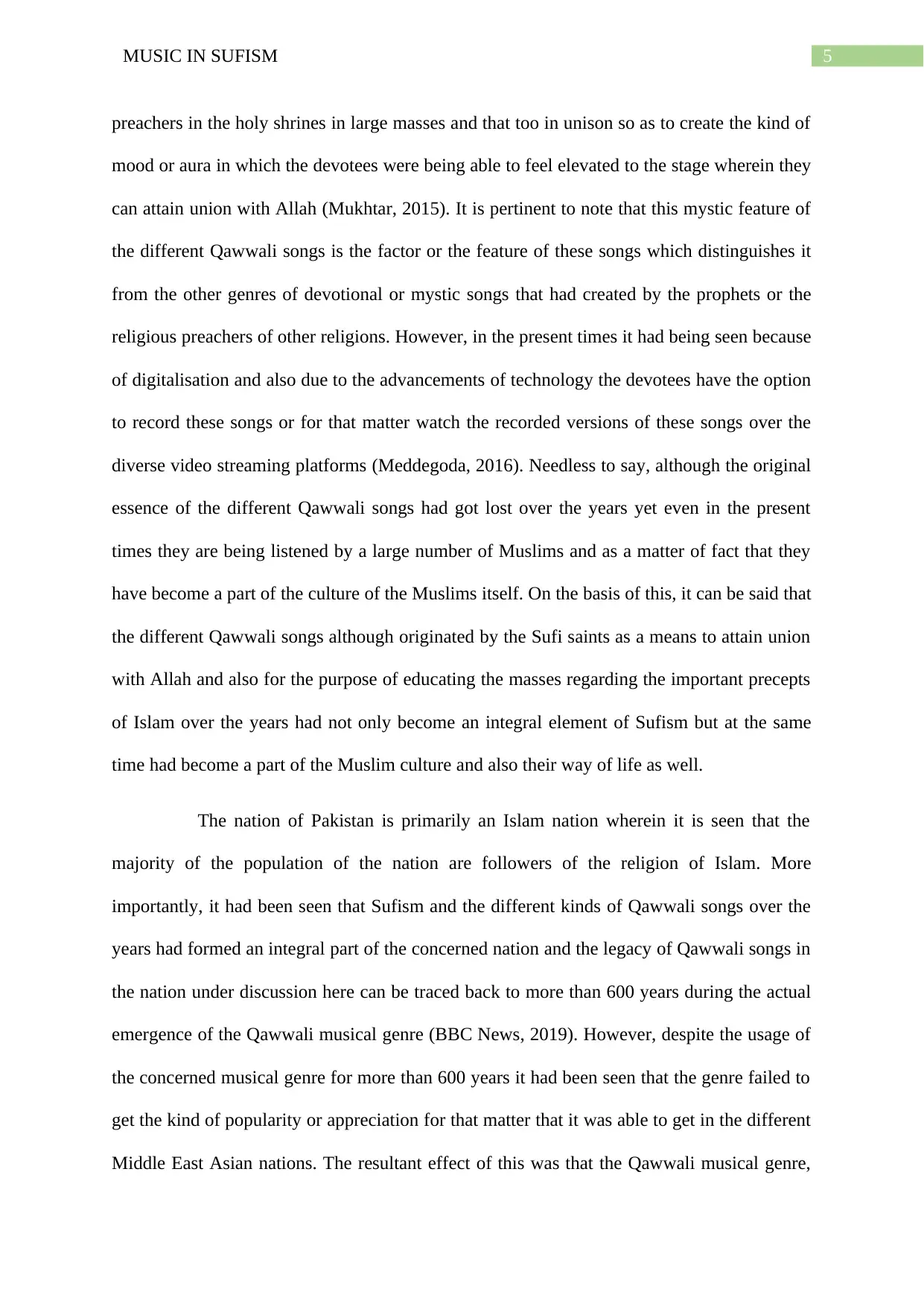
5MUSIC IN SUFISM
preachers in the holy shrines in large masses and that too in unison so as to create the kind of
mood or aura in which the devotees were being able to feel elevated to the stage wherein they
can attain union with Allah (Mukhtar, 2015). It is pertinent to note that this mystic feature of
the different Qawwali songs is the factor or the feature of these songs which distinguishes it
from the other genres of devotional or mystic songs that had created by the prophets or the
religious preachers of other religions. However, in the present times it had being seen because
of digitalisation and also due to the advancements of technology the devotees have the option
to record these songs or for that matter watch the recorded versions of these songs over the
diverse video streaming platforms (Meddegoda, 2016). Needless to say, although the original
essence of the different Qawwali songs had got lost over the years yet even in the present
times they are being listened by a large number of Muslims and as a matter of fact that they
have become a part of the culture of the Muslims itself. On the basis of this, it can be said that
the different Qawwali songs although originated by the Sufi saints as a means to attain union
with Allah and also for the purpose of educating the masses regarding the important precepts
of Islam over the years had not only become an integral element of Sufism but at the same
time had become a part of the Muslim culture and also their way of life as well.
The nation of Pakistan is primarily an Islam nation wherein it is seen that the
majority of the population of the nation are followers of the religion of Islam. More
importantly, it had been seen that Sufism and the different kinds of Qawwali songs over the
years had formed an integral part of the concerned nation and the legacy of Qawwali songs in
the nation under discussion here can be traced back to more than 600 years during the actual
emergence of the Qawwali musical genre (BBC News, 2019). However, despite the usage of
the concerned musical genre for more than 600 years it had been seen that the genre failed to
get the kind of popularity or appreciation for that matter that it was able to get in the different
Middle East Asian nations. The resultant effect of this was that the Qawwali musical genre,
preachers in the holy shrines in large masses and that too in unison so as to create the kind of
mood or aura in which the devotees were being able to feel elevated to the stage wherein they
can attain union with Allah (Mukhtar, 2015). It is pertinent to note that this mystic feature of
the different Qawwali songs is the factor or the feature of these songs which distinguishes it
from the other genres of devotional or mystic songs that had created by the prophets or the
religious preachers of other religions. However, in the present times it had being seen because
of digitalisation and also due to the advancements of technology the devotees have the option
to record these songs or for that matter watch the recorded versions of these songs over the
diverse video streaming platforms (Meddegoda, 2016). Needless to say, although the original
essence of the different Qawwali songs had got lost over the years yet even in the present
times they are being listened by a large number of Muslims and as a matter of fact that they
have become a part of the culture of the Muslims itself. On the basis of this, it can be said that
the different Qawwali songs although originated by the Sufi saints as a means to attain union
with Allah and also for the purpose of educating the masses regarding the important precepts
of Islam over the years had not only become an integral element of Sufism but at the same
time had become a part of the Muslim culture and also their way of life as well.
The nation of Pakistan is primarily an Islam nation wherein it is seen that the
majority of the population of the nation are followers of the religion of Islam. More
importantly, it had been seen that Sufism and the different kinds of Qawwali songs over the
years had formed an integral part of the concerned nation and the legacy of Qawwali songs in
the nation under discussion here can be traced back to more than 600 years during the actual
emergence of the Qawwali musical genre (BBC News, 2019). However, despite the usage of
the concerned musical genre for more than 600 years it had been seen that the genre failed to
get the kind of popularity or appreciation for that matter that it was able to get in the different
Middle East Asian nations. The resultant effect of this was that the Qawwali musical genre,
⊘ This is a preview!⊘
Do you want full access?
Subscribe today to unlock all pages.

Trusted by 1+ million students worldwide
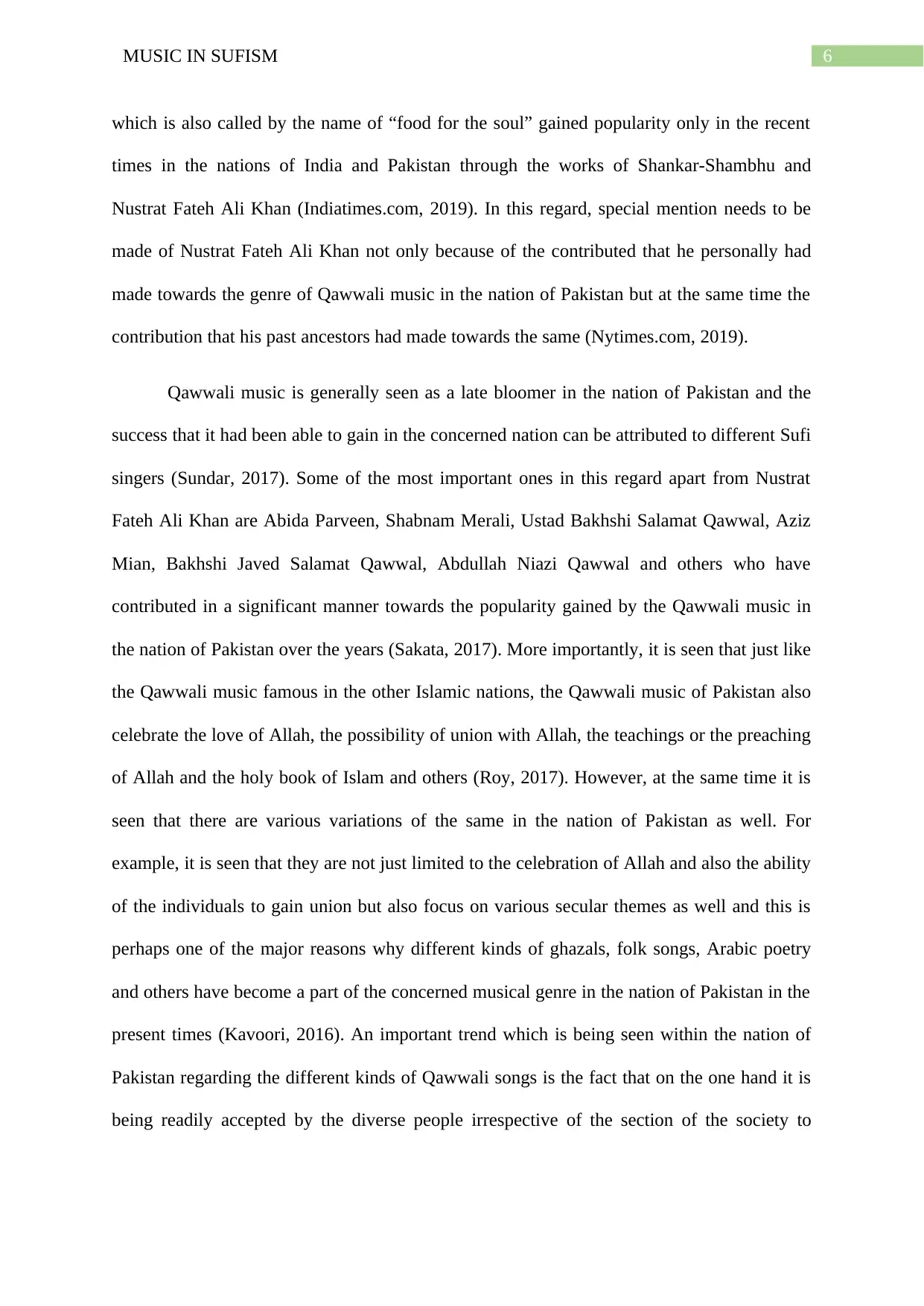
6MUSIC IN SUFISM
which is also called by the name of “food for the soul” gained popularity only in the recent
times in the nations of India and Pakistan through the works of Shankar-Shambhu and
Nustrat Fateh Ali Khan (Indiatimes.com, 2019). In this regard, special mention needs to be
made of Nustrat Fateh Ali Khan not only because of the contributed that he personally had
made towards the genre of Qawwali music in the nation of Pakistan but at the same time the
contribution that his past ancestors had made towards the same (Nytimes.com, 2019).
Qawwali music is generally seen as a late bloomer in the nation of Pakistan and the
success that it had been able to gain in the concerned nation can be attributed to different Sufi
singers (Sundar, 2017). Some of the most important ones in this regard apart from Nustrat
Fateh Ali Khan are Abida Parveen, Shabnam Merali, Ustad Bakhshi Salamat Qawwal, Aziz
Mian, Bakhshi Javed Salamat Qawwal, Abdullah Niazi Qawwal and others who have
contributed in a significant manner towards the popularity gained by the Qawwali music in
the nation of Pakistan over the years (Sakata, 2017). More importantly, it is seen that just like
the Qawwali music famous in the other Islamic nations, the Qawwali music of Pakistan also
celebrate the love of Allah, the possibility of union with Allah, the teachings or the preaching
of Allah and the holy book of Islam and others (Roy, 2017). However, at the same time it is
seen that there are various variations of the same in the nation of Pakistan as well. For
example, it is seen that they are not just limited to the celebration of Allah and also the ability
of the individuals to gain union but also focus on various secular themes as well and this is
perhaps one of the major reasons why different kinds of ghazals, folk songs, Arabic poetry
and others have become a part of the concerned musical genre in the nation of Pakistan in the
present times (Kavoori, 2016). An important trend which is being seen within the nation of
Pakistan regarding the different kinds of Qawwali songs is the fact that on the one hand it is
being readily accepted by the diverse people irrespective of the section of the society to
which is also called by the name of “food for the soul” gained popularity only in the recent
times in the nations of India and Pakistan through the works of Shankar-Shambhu and
Nustrat Fateh Ali Khan (Indiatimes.com, 2019). In this regard, special mention needs to be
made of Nustrat Fateh Ali Khan not only because of the contributed that he personally had
made towards the genre of Qawwali music in the nation of Pakistan but at the same time the
contribution that his past ancestors had made towards the same (Nytimes.com, 2019).
Qawwali music is generally seen as a late bloomer in the nation of Pakistan and the
success that it had been able to gain in the concerned nation can be attributed to different Sufi
singers (Sundar, 2017). Some of the most important ones in this regard apart from Nustrat
Fateh Ali Khan are Abida Parveen, Shabnam Merali, Ustad Bakhshi Salamat Qawwal, Aziz
Mian, Bakhshi Javed Salamat Qawwal, Abdullah Niazi Qawwal and others who have
contributed in a significant manner towards the popularity gained by the Qawwali music in
the nation of Pakistan over the years (Sakata, 2017). More importantly, it is seen that just like
the Qawwali music famous in the other Islamic nations, the Qawwali music of Pakistan also
celebrate the love of Allah, the possibility of union with Allah, the teachings or the preaching
of Allah and the holy book of Islam and others (Roy, 2017). However, at the same time it is
seen that there are various variations of the same in the nation of Pakistan as well. For
example, it is seen that they are not just limited to the celebration of Allah and also the ability
of the individuals to gain union but also focus on various secular themes as well and this is
perhaps one of the major reasons why different kinds of ghazals, folk songs, Arabic poetry
and others have become a part of the concerned musical genre in the nation of Pakistan in the
present times (Kavoori, 2016). An important trend which is being seen within the nation of
Pakistan regarding the different kinds of Qawwali songs is the fact that on the one hand it is
being readily accepted by the diverse people irrespective of the section of the society to
Paraphrase This Document
Need a fresh take? Get an instant paraphrase of this document with our AI Paraphraser
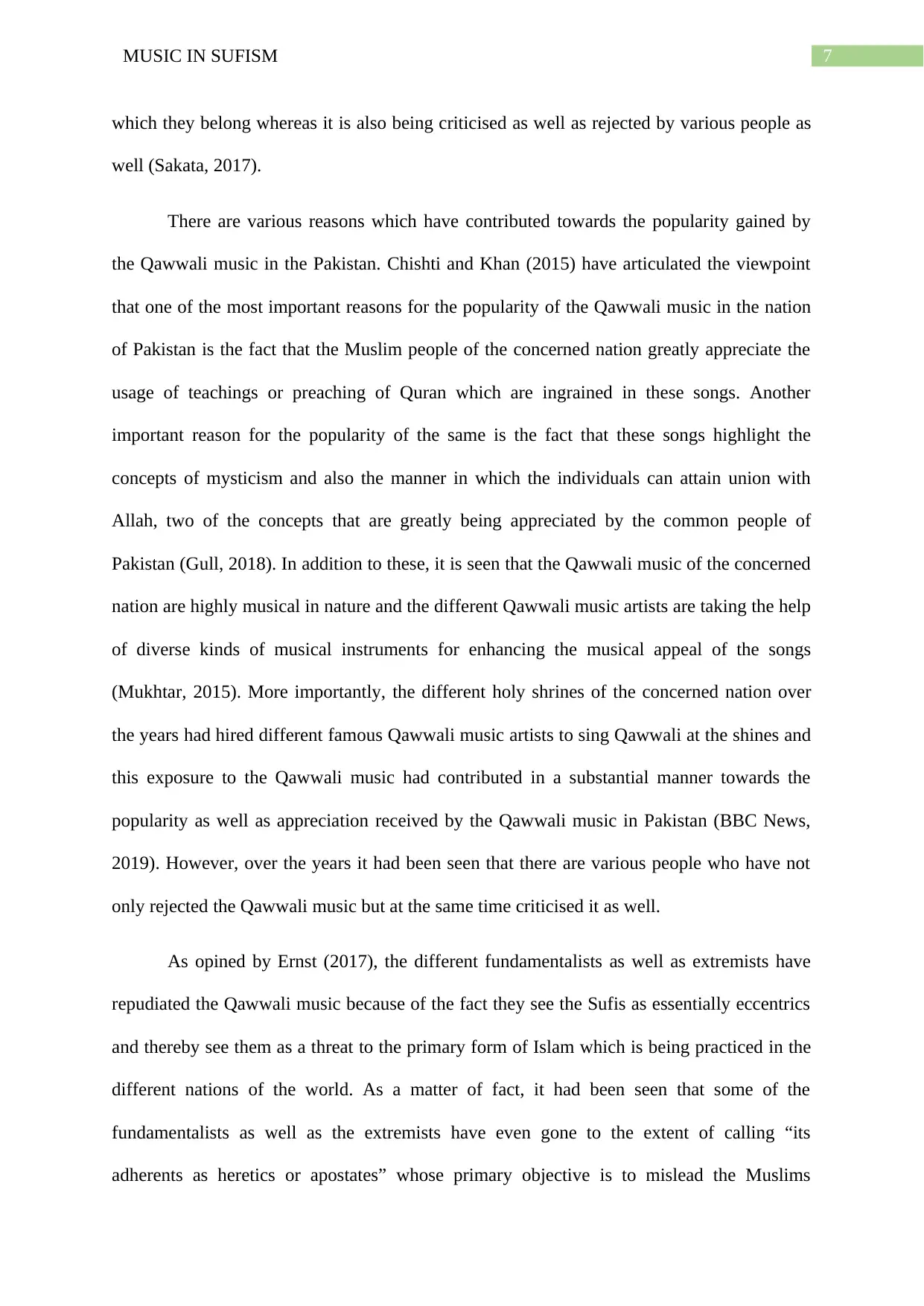
7MUSIC IN SUFISM
which they belong whereas it is also being criticised as well as rejected by various people as
well (Sakata, 2017).
There are various reasons which have contributed towards the popularity gained by
the Qawwali music in the Pakistan. Chishti and Khan (2015) have articulated the viewpoint
that one of the most important reasons for the popularity of the Qawwali music in the nation
of Pakistan is the fact that the Muslim people of the concerned nation greatly appreciate the
usage of teachings or preaching of Quran which are ingrained in these songs. Another
important reason for the popularity of the same is the fact that these songs highlight the
concepts of mysticism and also the manner in which the individuals can attain union with
Allah, two of the concepts that are greatly being appreciated by the common people of
Pakistan (Gull, 2018). In addition to these, it is seen that the Qawwali music of the concerned
nation are highly musical in nature and the different Qawwali music artists are taking the help
of diverse kinds of musical instruments for enhancing the musical appeal of the songs
(Mukhtar, 2015). More importantly, the different holy shrines of the concerned nation over
the years had hired different famous Qawwali music artists to sing Qawwali at the shines and
this exposure to the Qawwali music had contributed in a substantial manner towards the
popularity as well as appreciation received by the Qawwali music in Pakistan (BBC News,
2019). However, over the years it had been seen that there are various people who have not
only rejected the Qawwali music but at the same time criticised it as well.
As opined by Ernst (2017), the different fundamentalists as well as extremists have
repudiated the Qawwali music because of the fact they see the Sufis as essentially eccentrics
and thereby see them as a threat to the primary form of Islam which is being practiced in the
different nations of the world. As a matter of fact, it had been seen that some of the
fundamentalists as well as the extremists have even gone to the extent of calling “its
adherents as heretics or apostates” whose primary objective is to mislead the Muslims
which they belong whereas it is also being criticised as well as rejected by various people as
well (Sakata, 2017).
There are various reasons which have contributed towards the popularity gained by
the Qawwali music in the Pakistan. Chishti and Khan (2015) have articulated the viewpoint
that one of the most important reasons for the popularity of the Qawwali music in the nation
of Pakistan is the fact that the Muslim people of the concerned nation greatly appreciate the
usage of teachings or preaching of Quran which are ingrained in these songs. Another
important reason for the popularity of the same is the fact that these songs highlight the
concepts of mysticism and also the manner in which the individuals can attain union with
Allah, two of the concepts that are greatly being appreciated by the common people of
Pakistan (Gull, 2018). In addition to these, it is seen that the Qawwali music of the concerned
nation are highly musical in nature and the different Qawwali music artists are taking the help
of diverse kinds of musical instruments for enhancing the musical appeal of the songs
(Mukhtar, 2015). More importantly, the different holy shrines of the concerned nation over
the years had hired different famous Qawwali music artists to sing Qawwali at the shines and
this exposure to the Qawwali music had contributed in a substantial manner towards the
popularity as well as appreciation received by the Qawwali music in Pakistan (BBC News,
2019). However, over the years it had been seen that there are various people who have not
only rejected the Qawwali music but at the same time criticised it as well.
As opined by Ernst (2017), the different fundamentalists as well as extremists have
repudiated the Qawwali music because of the fact they see the Sufis as essentially eccentrics
and thereby see them as a threat to the primary form of Islam which is being practiced in the
different nations of the world. As a matter of fact, it had been seen that some of the
fundamentalists as well as the extremists have even gone to the extent of calling “its
adherents as heretics or apostates” whose primary objective is to mislead the Muslims
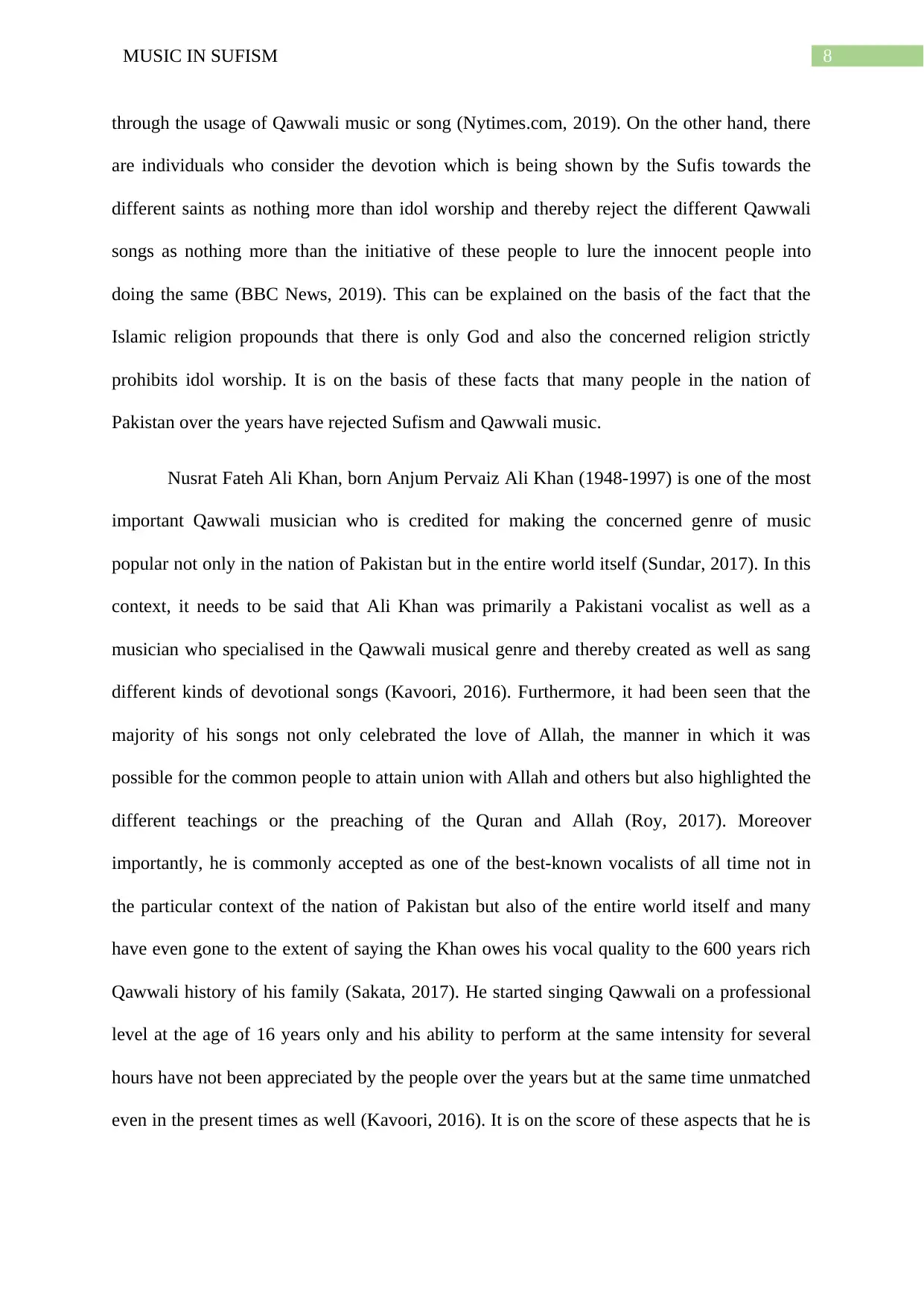
8MUSIC IN SUFISM
through the usage of Qawwali music or song (Nytimes.com, 2019). On the other hand, there
are individuals who consider the devotion which is being shown by the Sufis towards the
different saints as nothing more than idol worship and thereby reject the different Qawwali
songs as nothing more than the initiative of these people to lure the innocent people into
doing the same (BBC News, 2019). This can be explained on the basis of the fact that the
Islamic religion propounds that there is only God and also the concerned religion strictly
prohibits idol worship. It is on the basis of these facts that many people in the nation of
Pakistan over the years have rejected Sufism and Qawwali music.
Nusrat Fateh Ali Khan, born Anjum Pervaiz Ali Khan (1948-1997) is one of the most
important Qawwali musician who is credited for making the concerned genre of music
popular not only in the nation of Pakistan but in the entire world itself (Sundar, 2017). In this
context, it needs to be said that Ali Khan was primarily a Pakistani vocalist as well as a
musician who specialised in the Qawwali musical genre and thereby created as well as sang
different kinds of devotional songs (Kavoori, 2016). Furthermore, it had been seen that the
majority of his songs not only celebrated the love of Allah, the manner in which it was
possible for the common people to attain union with Allah and others but also highlighted the
different teachings or the preaching of the Quran and Allah (Roy, 2017). Moreover
importantly, he is commonly accepted as one of the best-known vocalists of all time not in
the particular context of the nation of Pakistan but also of the entire world itself and many
have even gone to the extent of saying the Khan owes his vocal quality to the 600 years rich
Qawwali history of his family (Sakata, 2017). He started singing Qawwali on a professional
level at the age of 16 years only and his ability to perform at the same intensity for several
hours have not been appreciated by the people over the years but at the same time unmatched
even in the present times as well (Kavoori, 2016). It is on the score of these aspects that he is
through the usage of Qawwali music or song (Nytimes.com, 2019). On the other hand, there
are individuals who consider the devotion which is being shown by the Sufis towards the
different saints as nothing more than idol worship and thereby reject the different Qawwali
songs as nothing more than the initiative of these people to lure the innocent people into
doing the same (BBC News, 2019). This can be explained on the basis of the fact that the
Islamic religion propounds that there is only God and also the concerned religion strictly
prohibits idol worship. It is on the basis of these facts that many people in the nation of
Pakistan over the years have rejected Sufism and Qawwali music.
Nusrat Fateh Ali Khan, born Anjum Pervaiz Ali Khan (1948-1997) is one of the most
important Qawwali musician who is credited for making the concerned genre of music
popular not only in the nation of Pakistan but in the entire world itself (Sundar, 2017). In this
context, it needs to be said that Ali Khan was primarily a Pakistani vocalist as well as a
musician who specialised in the Qawwali musical genre and thereby created as well as sang
different kinds of devotional songs (Kavoori, 2016). Furthermore, it had been seen that the
majority of his songs not only celebrated the love of Allah, the manner in which it was
possible for the common people to attain union with Allah and others but also highlighted the
different teachings or the preaching of the Quran and Allah (Roy, 2017). Moreover
importantly, he is commonly accepted as one of the best-known vocalists of all time not in
the particular context of the nation of Pakistan but also of the entire world itself and many
have even gone to the extent of saying the Khan owes his vocal quality to the 600 years rich
Qawwali history of his family (Sakata, 2017). He started singing Qawwali on a professional
level at the age of 16 years only and his ability to perform at the same intensity for several
hours have not been appreciated by the people over the years but at the same time unmatched
even in the present times as well (Kavoori, 2016). It is on the score of these aspects that he is
⊘ This is a preview!⊘
Do you want full access?
Subscribe today to unlock all pages.

Trusted by 1+ million students worldwide
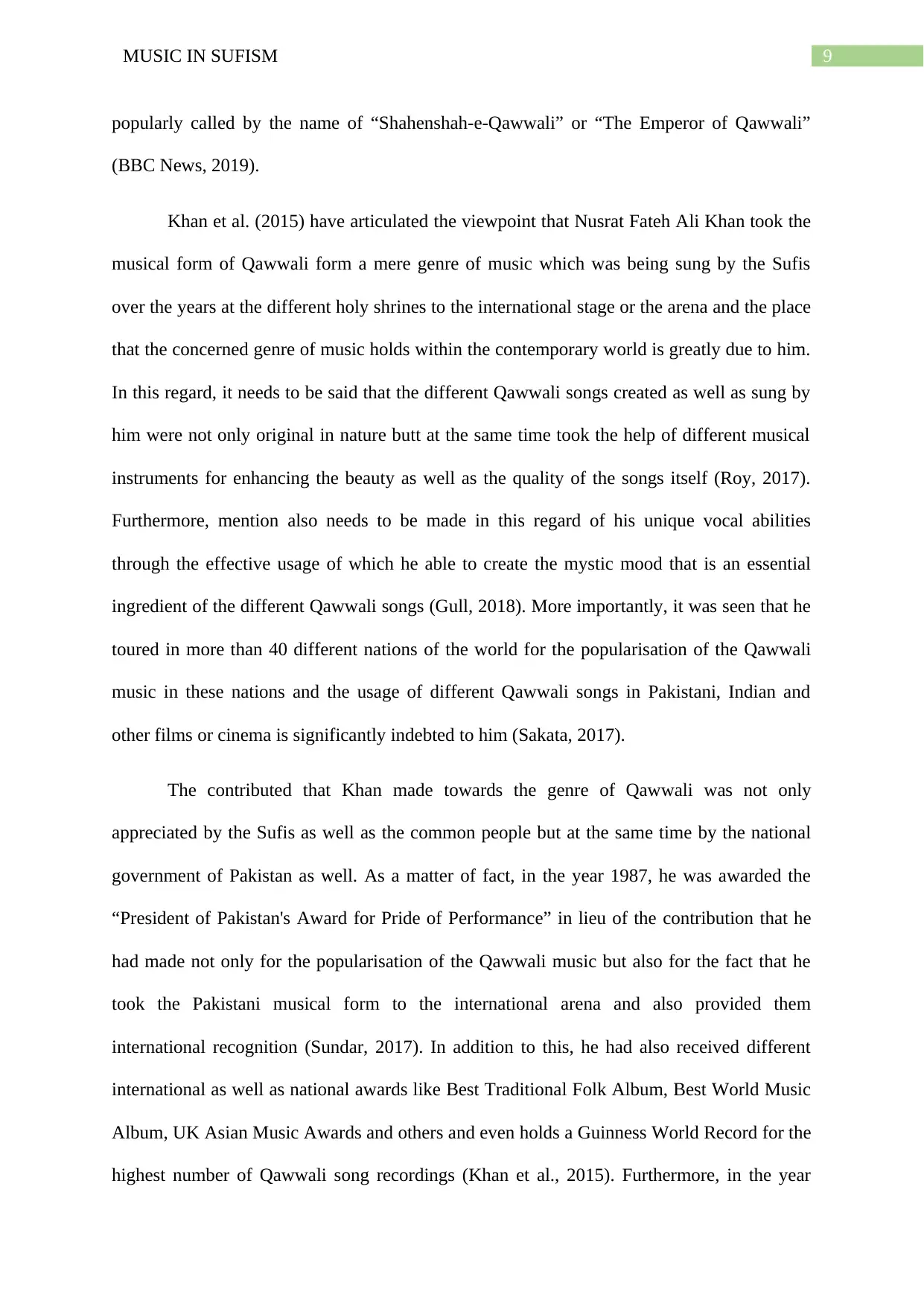
9MUSIC IN SUFISM
popularly called by the name of “Shahenshah-e-Qawwali” or “The Emperor of Qawwali”
(BBC News, 2019).
Khan et al. (2015) have articulated the viewpoint that Nusrat Fateh Ali Khan took the
musical form of Qawwali form a mere genre of music which was being sung by the Sufis
over the years at the different holy shrines to the international stage or the arena and the place
that the concerned genre of music holds within the contemporary world is greatly due to him.
In this regard, it needs to be said that the different Qawwali songs created as well as sung by
him were not only original in nature butt at the same time took the help of different musical
instruments for enhancing the beauty as well as the quality of the songs itself (Roy, 2017).
Furthermore, mention also needs to be made in this regard of his unique vocal abilities
through the effective usage of which he able to create the mystic mood that is an essential
ingredient of the different Qawwali songs (Gull, 2018). More importantly, it was seen that he
toured in more than 40 different nations of the world for the popularisation of the Qawwali
music in these nations and the usage of different Qawwali songs in Pakistani, Indian and
other films or cinema is significantly indebted to him (Sakata, 2017).
The contributed that Khan made towards the genre of Qawwali was not only
appreciated by the Sufis as well as the common people but at the same time by the national
government of Pakistan as well. As a matter of fact, in the year 1987, he was awarded the
“President of Pakistan's Award for Pride of Performance” in lieu of the contribution that he
had made not only for the popularisation of the Qawwali music but also for the fact that he
took the Pakistani musical form to the international arena and also provided them
international recognition (Sundar, 2017). In addition to this, he had also received different
international as well as national awards like Best Traditional Folk Album, Best World Music
Album, UK Asian Music Awards and others and even holds a Guinness World Record for the
highest number of Qawwali song recordings (Khan et al., 2015). Furthermore, in the year
popularly called by the name of “Shahenshah-e-Qawwali” or “The Emperor of Qawwali”
(BBC News, 2019).
Khan et al. (2015) have articulated the viewpoint that Nusrat Fateh Ali Khan took the
musical form of Qawwali form a mere genre of music which was being sung by the Sufis
over the years at the different holy shrines to the international stage or the arena and the place
that the concerned genre of music holds within the contemporary world is greatly due to him.
In this regard, it needs to be said that the different Qawwali songs created as well as sung by
him were not only original in nature butt at the same time took the help of different musical
instruments for enhancing the beauty as well as the quality of the songs itself (Roy, 2017).
Furthermore, mention also needs to be made in this regard of his unique vocal abilities
through the effective usage of which he able to create the mystic mood that is an essential
ingredient of the different Qawwali songs (Gull, 2018). More importantly, it was seen that he
toured in more than 40 different nations of the world for the popularisation of the Qawwali
music in these nations and the usage of different Qawwali songs in Pakistani, Indian and
other films or cinema is significantly indebted to him (Sakata, 2017).
The contributed that Khan made towards the genre of Qawwali was not only
appreciated by the Sufis as well as the common people but at the same time by the national
government of Pakistan as well. As a matter of fact, in the year 1987, he was awarded the
“President of Pakistan's Award for Pride of Performance” in lieu of the contribution that he
had made not only for the popularisation of the Qawwali music but also for the fact that he
took the Pakistani musical form to the international arena and also provided them
international recognition (Sundar, 2017). In addition to this, he had also received different
international as well as national awards like Best Traditional Folk Album, Best World Music
Album, UK Asian Music Awards and others and even holds a Guinness World Record for the
highest number of Qawwali song recordings (Khan et al., 2015). Furthermore, in the year
Paraphrase This Document
Need a fresh take? Get an instant paraphrase of this document with our AI Paraphraser
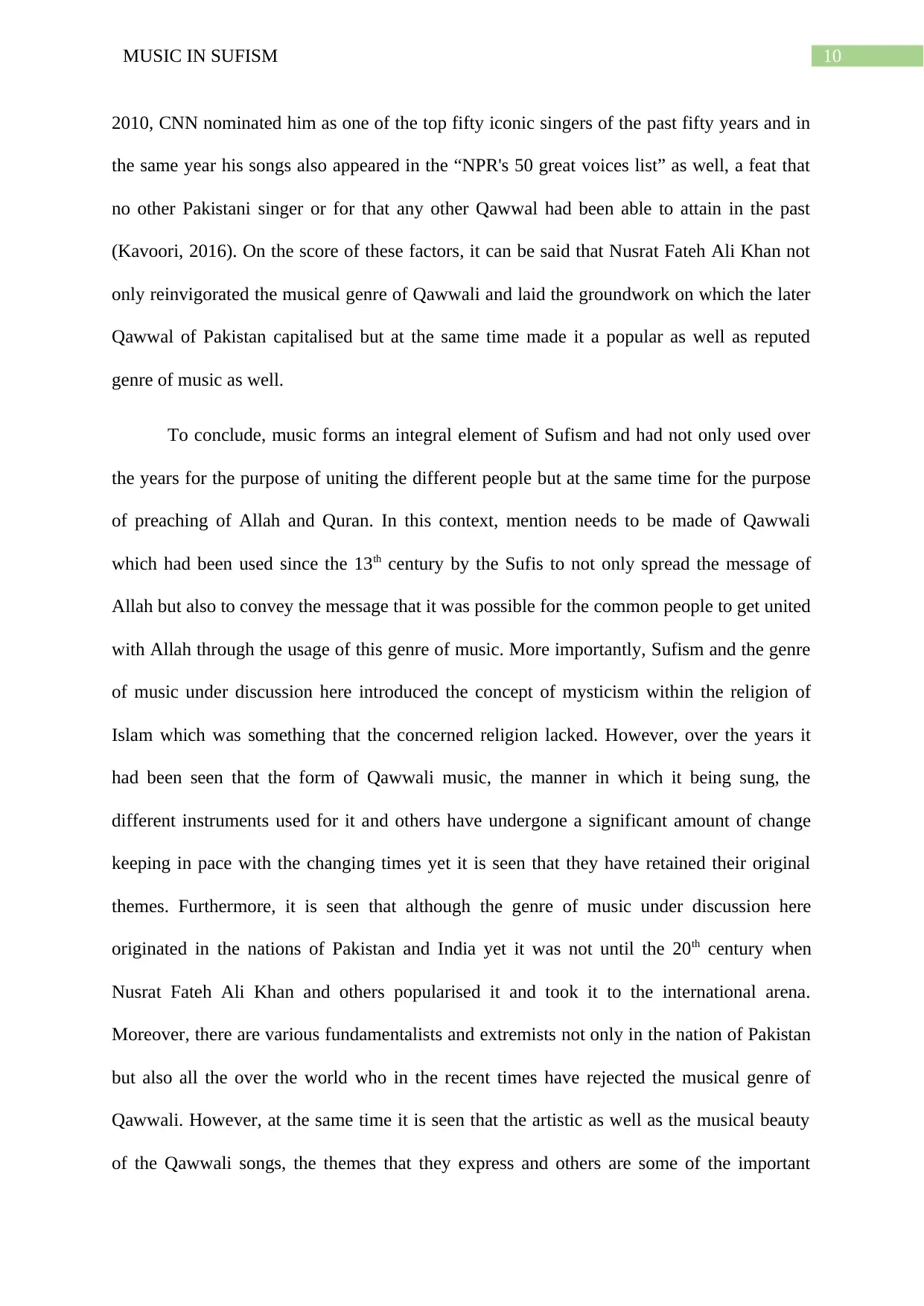
10MUSIC IN SUFISM
2010, CNN nominated him as one of the top fifty iconic singers of the past fifty years and in
the same year his songs also appeared in the “NPR's 50 great voices list” as well, a feat that
no other Pakistani singer or for that any other Qawwal had been able to attain in the past
(Kavoori, 2016). On the score of these factors, it can be said that Nusrat Fateh Ali Khan not
only reinvigorated the musical genre of Qawwali and laid the groundwork on which the later
Qawwal of Pakistan capitalised but at the same time made it a popular as well as reputed
genre of music as well.
To conclude, music forms an integral element of Sufism and had not only used over
the years for the purpose of uniting the different people but at the same time for the purpose
of preaching of Allah and Quran. In this context, mention needs to be made of Qawwali
which had been used since the 13th century by the Sufis to not only spread the message of
Allah but also to convey the message that it was possible for the common people to get united
with Allah through the usage of this genre of music. More importantly, Sufism and the genre
of music under discussion here introduced the concept of mysticism within the religion of
Islam which was something that the concerned religion lacked. However, over the years it
had been seen that the form of Qawwali music, the manner in which it being sung, the
different instruments used for it and others have undergone a significant amount of change
keeping in pace with the changing times yet it is seen that they have retained their original
themes. Furthermore, it is seen that although the genre of music under discussion here
originated in the nations of Pakistan and India yet it was not until the 20th century when
Nusrat Fateh Ali Khan and others popularised it and took it to the international arena.
Moreover, there are various fundamentalists and extremists not only in the nation of Pakistan
but also all the over the world who in the recent times have rejected the musical genre of
Qawwali. However, at the same time it is seen that the artistic as well as the musical beauty
of the Qawwali songs, the themes that they express and others are some of the important
2010, CNN nominated him as one of the top fifty iconic singers of the past fifty years and in
the same year his songs also appeared in the “NPR's 50 great voices list” as well, a feat that
no other Pakistani singer or for that any other Qawwal had been able to attain in the past
(Kavoori, 2016). On the score of these factors, it can be said that Nusrat Fateh Ali Khan not
only reinvigorated the musical genre of Qawwali and laid the groundwork on which the later
Qawwal of Pakistan capitalised but at the same time made it a popular as well as reputed
genre of music as well.
To conclude, music forms an integral element of Sufism and had not only used over
the years for the purpose of uniting the different people but at the same time for the purpose
of preaching of Allah and Quran. In this context, mention needs to be made of Qawwali
which had been used since the 13th century by the Sufis to not only spread the message of
Allah but also to convey the message that it was possible for the common people to get united
with Allah through the usage of this genre of music. More importantly, Sufism and the genre
of music under discussion here introduced the concept of mysticism within the religion of
Islam which was something that the concerned religion lacked. However, over the years it
had been seen that the form of Qawwali music, the manner in which it being sung, the
different instruments used for it and others have undergone a significant amount of change
keeping in pace with the changing times yet it is seen that they have retained their original
themes. Furthermore, it is seen that although the genre of music under discussion here
originated in the nations of Pakistan and India yet it was not until the 20th century when
Nusrat Fateh Ali Khan and others popularised it and took it to the international arena.
Moreover, there are various fundamentalists and extremists not only in the nation of Pakistan
but also all the over the world who in the recent times have rejected the musical genre of
Qawwali. However, at the same time it is seen that the artistic as well as the musical beauty
of the Qawwali songs, the themes that they express and others are some of the important

11MUSIC IN SUFISM
factors which have contributed towards the wide popularity and the acceptance of the same.
These aspects of Sufism and Qawwali become apparent from the above analysis.
factors which have contributed towards the wide popularity and the acceptance of the same.
These aspects of Sufism and Qawwali become apparent from the above analysis.
⊘ This is a preview!⊘
Do you want full access?
Subscribe today to unlock all pages.

Trusted by 1+ million students worldwide
1 out of 15
Related Documents
Your All-in-One AI-Powered Toolkit for Academic Success.
+13062052269
info@desklib.com
Available 24*7 on WhatsApp / Email
![[object Object]](/_next/static/media/star-bottom.7253800d.svg)
Unlock your academic potential
Copyright © 2020–2026 A2Z Services. All Rights Reserved. Developed and managed by ZUCOL.





